Last month, a disturbing headline from The Times of Israel proclaimed, “Support for Israel among young US evangelical Christians drops sharply — survey.” The survey, commissioned by University of North Carolina at Pembroke professors Motti Inbari and Kirill Bumin in March and April of this year, is a follow-up of sorts. It explores various trends in young evangelicals’ sentiments about Israel and Palestine that the researchers’ findings in a broader survey of evangelicals anticipated three years prior. Among these trends stands one shocking statistic, captured in the Times of Israel article’s subheading: “Since 2018, backing for Israel dropped from 75% to 33%.”
Other articles, domestic and international, conveyed the story with a similar concern. For friends and defenders of Israel, this change—a 42 percentage point drop—is troubling, particularly in light of Israel’s increasing reliance upon its evangelical supporters. With only three years separating these numbers, why are so many young evangelicals manifesting such a drastic change of heart?
Short answer: Maybe they aren’t. Maybe it just looks that way.
While we are not sociologists, we both see what matters to our young evangelical peers, and we wonder whether the prognosis is really so completely grim. A closer look at the numbers and the trends within evangelicalism suggests a more complicated story.
An Artificial Cliff
The headline statistic often cited in these articles suggests near-monolithic evangelical support for Israel in 2018 (a whopping 75 percent of respondents) towering over a meager 2.7 percent of outliers who supported Palestinians and 22 percent who supported neither. But these numbers reflect evangelical sentiments of all ages polled and are not relevant when asking about a change of heart among the 18–29-year-olds.
The Washington Post’s article covering this same survey data provides age-specific figures: just under 69 percent of young evangelicals 18–29 years old supported Israel in 2018, with 5.6 percent supporting Palestine and 25 percent supporting neither. These figures, while comparable to the former ones, tell us that young evangelicals were already tipping the broader scale away from total evangelical support for Israel in 2018, even if only slightly. The “Support for Israel” drop we hope to explain just decisively shrank from a 42 percentage point drop to a 36 percentage point drop, just by looking at the right numbers.
But perhaps even these age-specific numbers aren’t what they seem. The two surveys (2018 and 2021) are taken from different sample sizes—varying significantly in ethnic representation—with different frames for the most important question and at very different moments in the current milieu.
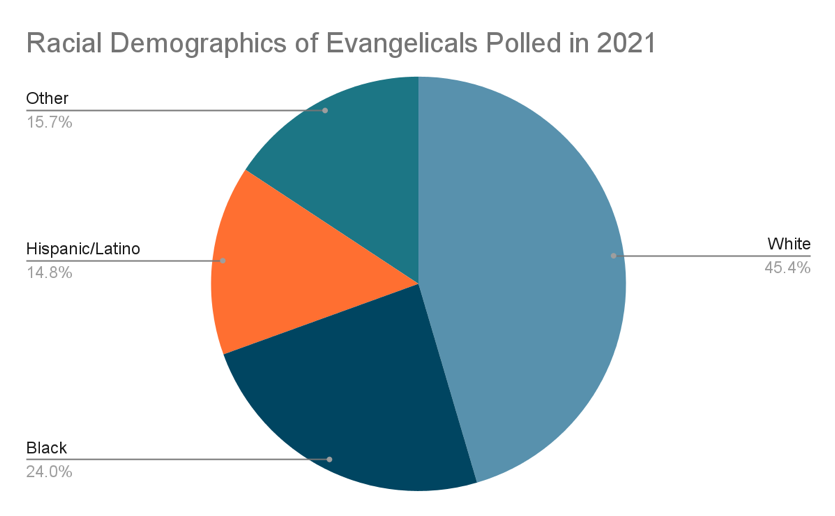
The 2021 racial breakdown sees about a 14 percentage point shift in the polled demographic away from White respondents toward minority respondents. While we cannot say exactly how much of the supposed gap this 14 percentage point change could explain, the Washington Post notes that the researchers “found wide rifts in this year’s young evangelicals survey” between these racial subgroups’ answers, suggesting that the elusive 36 percentage point gap (that is, a gap reflecting the actual change in young evangelical opinion at large) could very well be in the 20s instead.
So by looking closer at the numbers, that 42 percentage point “plummet” in support for Israel may in fact be closer to 20 percentage points. That still warrants an explanation, but not a drastic one. While there is a downward trend, a cursory reading and reporting of the data artificially steepen its slope. Still, something had to change in the last three years, and three undercurrents collectively pushed this downward trend.
Polarization, Even in the Polling
The 2018 poll rendered a few fascinating conclusions about young evangelicals, most notably predicting a downward trend in their support for Israel in the near future. Researchers Inbari and Bumin note that many commentators are quick to blame young evangelicals’ declining support for Israel on increasing secularism. But they found that young evangelicals are more, not less, religious than many of their older counterparts. That statistic has held up, despite Knesset Christian Allies Caucus Director Josh Reinstein’s accusation that the polled evangelicals are simply “not Evangelical” and must not go to church on Sundays (an inference that both polls flatly contradict).
This is not to say that theology and eschatology are irrelevant. The Reformed movement within Christianity, for example, tends to be coupled with a supersessionist theology. This theology undermines the ongoing significance of Israel and the Jewish people for Christians today. It also rejects the dispensational eschatological views that helped drive American evangelical support of Israel. The theological strength of such a movement is not insignificant.
However, the researchers found that young evangelicals, while beginning to abandon certain eschatologies and theological frameworks that traditionally engendered support for Israel, do not express a negative view of the Jewish people. If anything, their opinions of both Jews and Muslims are decidedly positive, which presents respondents with a very difficult choice regarding the political and social bodies often conflated with each.
The central question of the 2018 poll was, “Where do you put your support?” followed by five choices. Between two pro-Israel options and two pro-Palestinian options sat a supposedly neutral option that read, “Support Neither.” Researchers removed an initial “I Don’t Know” option that would have taken about 14 percent of responses. This change left anyone unwilling to voice partisan support in a misanthropic-sounding middle camp.
Similarly, the 2021 poll question reads, “In relation to the Israeli-Palestinian dispute, where do you place your support?” Three tiers of both pro-Israel and pro-Palestinian support follow, separated by an option to “Support Neither.” But it is hardly likely that all who selected the latter option were simply apathetic or ambivalent about the situation. They simply had no way to voice support for both.
So instead, a very telling split is evident: near-even distribution of pro-Palestinian sentiments of varying degrees (totaling 24.3 percent), followed by a similarly even distribution of pro-Israeli sentiments (all slightly higher, totaling 33.3 percent). Between these sits a clear and decisive winner: “Support Neither,” holding 42.2 percent.
We have no reason to assume that 42.2 percent of young evangelicals are simply apathetic. An enormous 71 percent of those who chose the middle option cited that they “don’t know” why they “support neither Israel nor Palestinians.” An even larger majority failed an objective knowledge test on the current border dispute, exemplifying how little they know. So mere lack of information might very well be a chief culprit in constricting these young Christians paralyzed between clearly polarized camps.
Socialization, Then and Now
Hence, the most fascinating finding of the 2018 study: Inbari and Bumin hypothesized that the “process of socialization, through which individuals become aware of politics, learn political facts, and form values and attitudes, is an important part of the explanation of evangelicals’ support for Israel.” They then conclude by various means that socialization did largely inform young evangelicals’ opinions in 2018 and would continue to inform them moving forward.
If this is the case, we should consider the timing of both polls. The 2018 poll, conducted in April of that year, was surrounded by one unique talking point regarding Israel: President Donald Trump’s promise to move the US embassy from Tel Aviv to Jerusalem, formally acknowledging Jerusalem as the capital of Israel. Arguments about the political significance of Jerusalem abounded in political talk shows, articles, sermons, and public discourse. With enough buzz in evangelical circles about the need to support Israel in that season, a poll showing a favorable view of Israel is not shocking.
But in March 2021, well over half of young evangelicals reported rarely hearing talk about the importance of supporting Israel. Given the presidential election, the economy, the COVID-19 pandemic, and several other domestic issues, their conversations have largely not been about Israel, but America.
Most notably, in the wake of George Floyd’s death in 2020 and the contentious protests that followed, American evangelicals have very predictably fixated on race. Many have undertaken personal education into contemporary race relations and perpetuated new terminology. Construing American race problems within the categories of power dynamics, racial hierarchies, privilege, and systemic oppression has primed young evangelicals to see the rest of the world through these lenses too. And proponents of pro-Palestinian movements intentionally speak of the Israeli-Palestinian dispute in this same way.
Projection, Unwarranted
In a recent article in The Atlantic, Matti Friedman argues that Americans misread the situation in Israel by projecting American problems like race and segregation onto a very different and incommensurable context. “Although Israel, like America, is deeply messed up, it’s messed up in completely different ways,” he says.
Friedman’s point is key here. As we begin to address the issues closest to our heart, we project them onto other issues more distant from us. Without proper education into the idiosyncrasies of the Israeli-Palestinian situation, we are likely to misdiagnose its problems altogether by equating them with our own. This process, coupled with various forms of “deconstructing” the beliefs and presuppositions we were raised on, cannot help but shake us—perhaps temporarily—from the partisan beliefs of our elders.
Conclusion
The influence of our current historical moment may help to explain why support for Israel dropped between the 2018 and 2021 polls. Terminology about Israel and the Palestinian territories increasingly overlaps with that of American social justice causes. Ethnic nationalism (of which Zionism is traditionally considered one form) is altogether smeared by the mud thrown around Trumpism. Scores of contradicting facts are exchanged for simple narratives. Complex reporting is flattened into simple infographics. All of these social changes stand alongside the influence of differing theological perspectives upon young evangelicals’ view of Israel.
This does not mean, however, that there has been a radical or inflexible change of heart among young evangelicals in the last three years. Amid such a volatile time, young evangelicals may have hesitated to take a strongly partisan stance on such a tumultuous and dichotomized issue. But if the 2021 poll had included an option to support both Israel and the Palestinians, we propose that many young evangelicals may have eagerly chosen this option. Never mind the fact that they don’t know how to support both. They want to.
To that end, if supporting both means supporting Israel, then the gap can be filled again. Not through the alarmism coloring the reports on these surveys, but through encouragement that our hearts are in the right place, followed swiftly by impassioned education and calls to action, so that our minds and bodies can be there too. Our support for Israel can be built on stronger motivations: commitment to Israel and its people based on charity and justice rather than dogma, on brotherly love rather than eschatological necessity. Set on these foundations, flowing from the truth of the Gospel, coupled with compassion for the Palestinian people, and evidencing the love of God all around, a new support for Israel can—we hope—flourish among young evangelicals today.
Bibliography
Brand, D. (2021, May 28). Knesset Christian Caucus Leader Rejects Poll That Support for Israel Has Dropped Among Young American Evangelical Christians. Breitbart. Retrieved May 28, 2021, from https://www.breitbart.com/middle-east/2021/05/28/poll-support-for-israel-drops-sharply-among-young-american-evangelicals/
Friedman, M. (2021, May 24). Israel’s Problems Are Not Like America’s. The Atlantic. Retrieved May 28, 2021, from https://www.theatlantic.com/ideas/archive/2021/05/americanization-israeli-palestinian-debate-blm/618967/
i24 News. (2021, May 25). Sharp decline in support for Israel among young US evangelical Christians: poll. i24 News. Retrieved May 28, 2021, from https://www.i24news.tv/en/news/international/americas/1621928086-sharp-decline-in-support-for-israel-among-young-us-evangelical-christians-poll
Inbari, M., Bumin, K. M., & Byrd, M. G. (2020, January 14). Why Do Evangelicals Support Israel? Religion and Politics Section of the American Political Science Association, 14(1), 1–36. Cambridge University Press. https://doi.org/10.1017/S175504831900052X.
Inbari, Motti and Kirill Bumin. (2021) Change of the Guard: Young Evangelicals and Israeli-Palestinian Dispute [Conference Presentation], University of North Carolina at Pembroke, Pembroke, NC, United States.
Jenkins, J. (2021, May 26). Survey: Young, diverse generation of evangelicals shows growing ambivalence toward Israel. The Washington Post. Retrieved May 28, 2021, from https://www.washingtonpost.com/religion/survey-young-diverse-generation-of-evangelicals-shows-growing-ambivalence-toward-israel/2021/05/26/5c3bd332-be6b-11eb-922a-c40c9774bc48_story.html
Magid, J. (2021, May 25). Support for Israel among young US evangelical Christians drops sharply — survey. The Times of Israel. Retrieved May 28, 2021, from https://www.timesofisrael.com/support-for-israel-among-young-us-evangelicals-drops-sharply-survey/ Pandolfo, C. (2021, May 25). Support for Israel among young US evangelicals craters from 75% to 34% in new survey. TheBlaze. Retrieved May 28, 2021, from https://www.theblaze.com/news/support-israel-young-evangelicals-craters
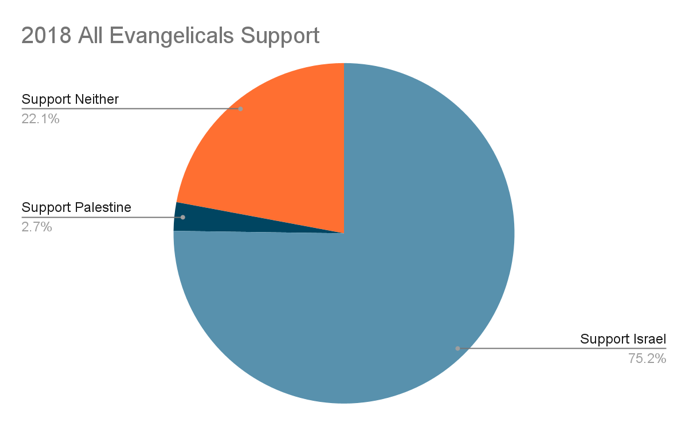
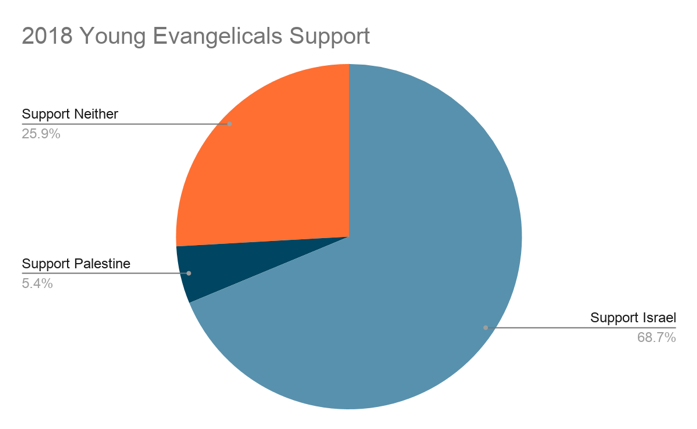
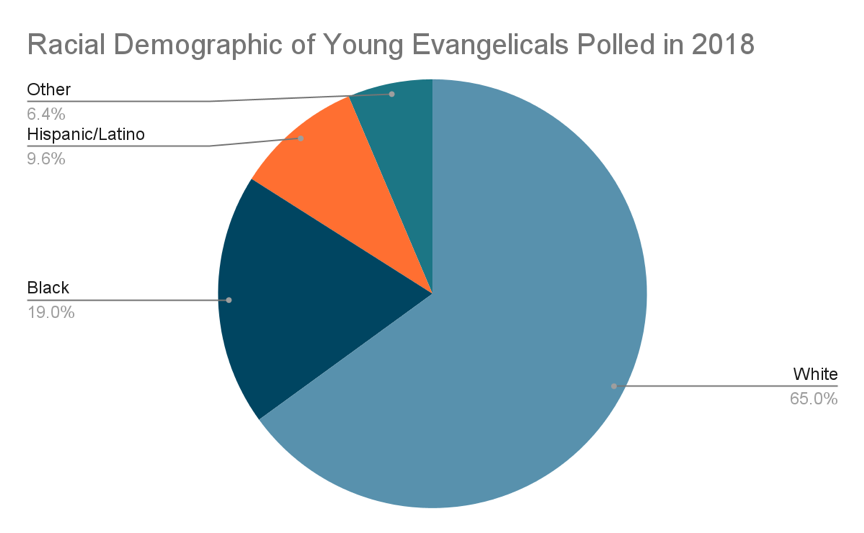

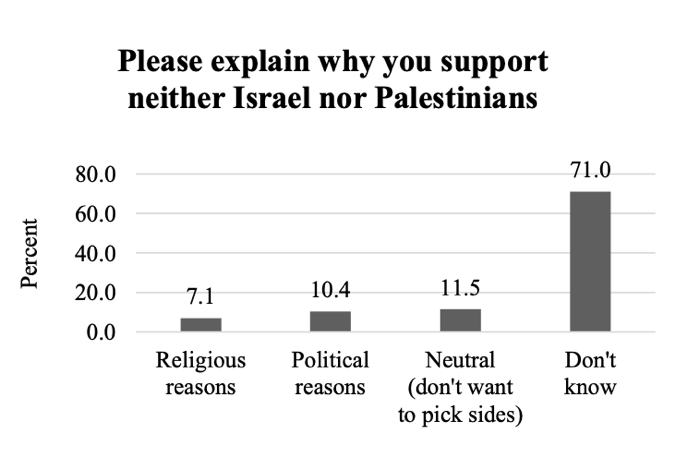








 Sponsor a student for Christianity & National Security 2024
Sponsor a student for Christianity & National Security 2024